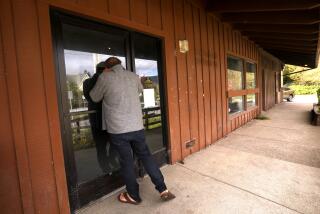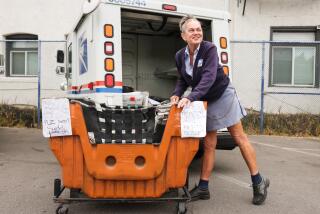Carrying On Despite Anthrax
Attending Cal State Fullerton full time while working full
time for the U.S. Postal Service has proved to be a challenge. The biggest challenge began in mid-October, when the anthrax bacteria infected the first postal workers. It was almost like a loss of innocence.
Before Sept. 11, my biggest worry while at work at the Baldwin Park Post Office was trying to find the time to study during my lunch break. The automation of the pPostal sService was supposed to make life easier and more efficient. No one ever thought technology could work against us.
When two postal workers who worked at the Brentwood mail-processing facility in Washington died, the threat became real.
An eExpress letter takes less than a day to go from Washington to Southern California, and that meant the possible threat became nationwide. The chatter in the break room went from the usual joking and small talk to concerns about who could be next.
Hearing Postmaster General Jack Potter announce that the pPostal sService couldn’t guarantee the safety of the mail meant also that it couldn’t guarantee the safety of its employees. That’s not what I needed to hear. I was facing midterms, and I owed a major project in each class.
When you stop to think that a letter mailed from Washington to Los Angeles can carry contaminants, the last thing you want to hear is: “tThere is nothing we can do.”
U.S. Postal sService meetings usually include a video from headquarters telling us exactly what Aanthrax is and how it works and what the pPostal sService is doing to protect its employees and customers. The pPostal sService and the National Assn. of Letter Carriers, the carriers union, wasted no time in putting differences aside and working together. We were all of a sudden a family. Within days, disposable nitrile gloves and filtering respirator masks were shipped to each postal facility to give some protection from the Aanthrax bacteria.
Many postal workers are wearing the gloves while handling mail in the office and on the street. The respirator masks require that we be certified to iensure we are using them properly. The first day, several of us got became ccertified, but no carrier or clerk that I have seen wears them in public view.
The main concern of the employees is not to cause a public panic. Can you imagine seeing your carrier walking down the street wearing a gas mask? Or going to buy stamps and hearing the clerk ask, muffled by the gas mask he or she is wearing, “”May I help you?””
The office where I work also puts two plastic bags in every delivery vehicle, so carriers can isolate suspect letters and packages. wWe look for mail addressed to government offices or officials, especially those with excess postage, no return address or whose return address is different from where we picked it up.
And, of course, we also look for any letter that we suspect contains a powdered substance or that has a powderc come out of it. After we isolated the letter or package, we would stop delivering and contact our supervisor, who would contact the proper agencies.
Postal workers are being trained to recognize suspect letters. With a bomb, once the package is isolated or passes through the system, the threat goes with it. With Aanthrax, once any item or surface is contaminated, it remains contaminated until it is detected and sterilized.
Throughout the day as I touch the mail and without thinking touch my face, I stop to think that I could be spreading Aanthrax.
The flow of information from the pPostal sService has taken the edge off a bit, but not every bit of information has been useful. One suggestion from headquarters advised carriers not to pick up letters unless a customer hands it to us. That suggestion was quickly rescinded once carriers pointed out that most mail picked up by carriers each day is left by customers in their mail boxes.
In a way, that was reassuring; it showed that the pPostal sService is open for input from all levels. Some of the simple comforts we took for granted are now considered a threat to us. For now, the loss of fans and air conditioning is barely noticed. If this threat continues into the summer it can cause serious problems.
One of the best days I had was when several customers greeted me on my route and told me how sorry they were about the deaths, and what a great job the pPostal sService is doing.
Juggling school and work can be a challenge in itself. Now add the latest threat of Aanthrax. With the support of the pPostal sService, the union and the public, it’s manageable.
More to Read
Sign up for Essential California
The most important California stories and recommendations in your inbox every morning.
You may occasionally receive promotional content from the Los Angeles Times.









